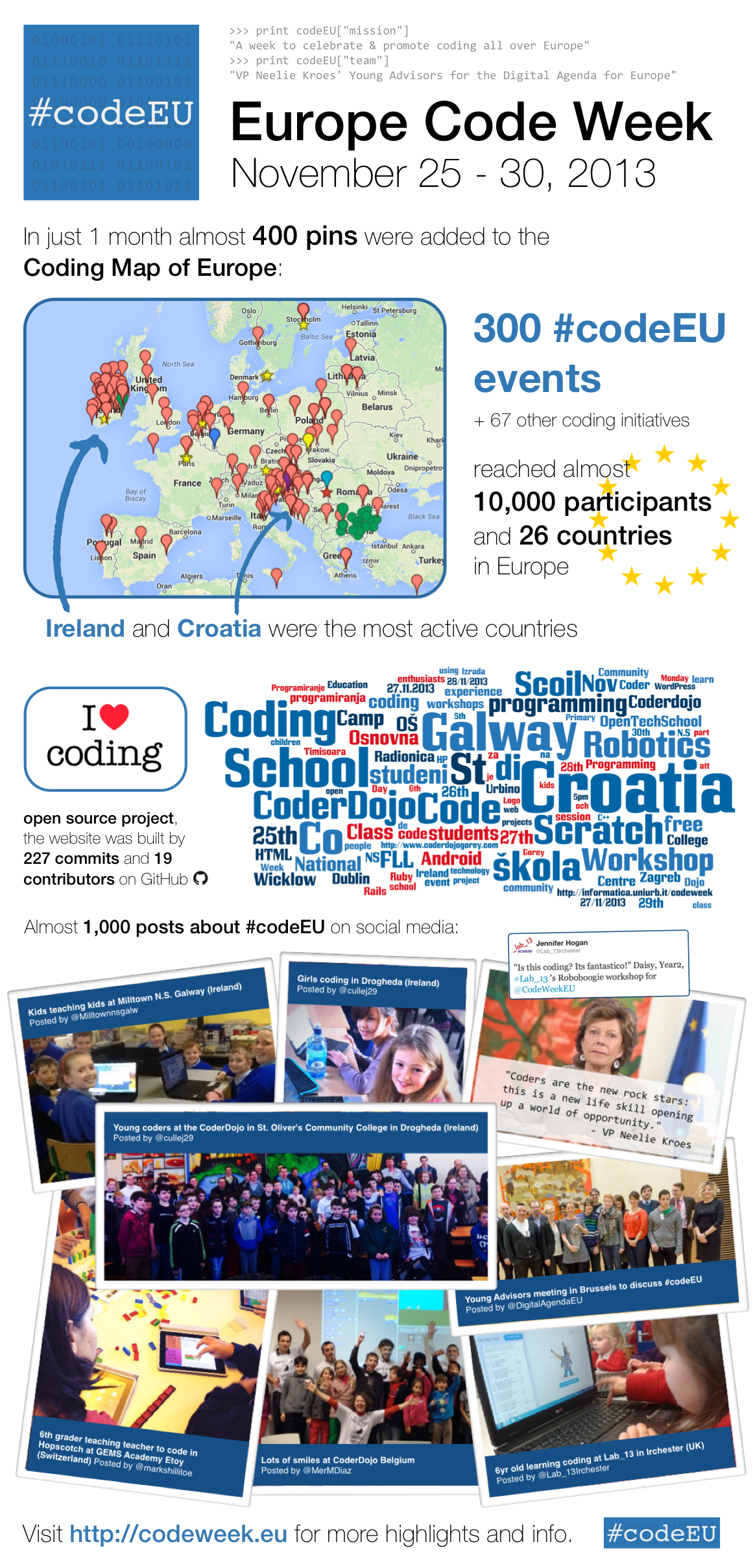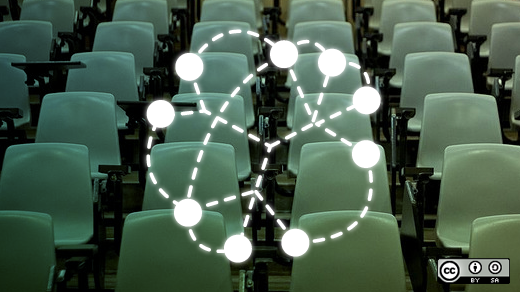The first Europe Code Week was held two months ago at schools and CoderDojos in 26 countries around Europe—Ireland and Croatia being the most active. The event was launched to help increase the knowledge shared with school-age children about coding, computer science, and technology by The Young Advisors (a group of young people dedicated to advancing a digital society working closely with the Vice President of the European Commission, Neelie Kroes).
During the events, kids from schools all over Europe used Scratch, Arduino boards, and other open source software and hardware to build thier projects (including robots)!
Each country that took part in Europe Code Week appointed an Ambassador to lead their event. I reached out to Ireland’s Julie Cullen, a teacher at St. Oliver’s College, Drogheda, Co. Louth, to get her take on the event. In this interview, Julie shares just how excited the kids were to work with code and computers, what open source software they hacked on, and what projects got underway. She also tells us what’s in store for this year’s #codeEU 2014.

You are a teacher, youth advisor to Neelie Kroes (VP of the European Commission), and ambassador for Europe Code Week. Could you tell us a bit about yourself?
I have been a teacher for six years and completed a Masters in Education (via e-learning) last year. My degree ignited an interest in the use of technology in education. I began to interact with other teachers who felt the same way—mostly through The Computers in Education Society of Ireland (CESI). I started to realise the importance of coding as a new literacy through Twitter conversations (#edchatie), CESI meetings, and collaborations with my colleagues at St. Oliver's Community College. As an English teacher, I spend my day trying to encourage students to be more creative and improve their critical thinking skills. Even though I don't teach coding, the skills that coders need are very similar to those that we use in my English class.
EU Code Week Ireland from galwayeducentre on Vimeo.
The site for Europe Code Week says the event is about a group of young people who believe in a world where ideas are given a chance to change the world. Tell us more about that.
We wanted to encourage more people to become creators, not just consumers of technology. We also wanted to connect various initiatives, who are already helping Europeans learn more about coding and technology in general. Not necessarily just young people. We should all learn more about technologies we use every day. That's why we envisioned a week to celebrate ongoing efforts like CoderDojos, Rails Girls, and more—and to encourage new initiatives to be born by sharing best practices.
The main purpose of Europe Code Week is to give more visibility to great projects and initiatives that are already happening across Europe and are teaching children and adults about technology, often without recognition and funding. By doing that, we hoped to inspire new projects to be born and more citizens to learn about the tools they use every day to get things done.
Plus, the Europe Code Week website was built with Jekyll, an open source static page generator written in Ruby and hosted on GitHub Pages. This allows anyone in the world to send us pull requests and to add new content.

How did the Ambassadors for each country spread the word and get schools and kids to sign up? Was the response greater than you expected?
Alja, a Young Advisor from Slovenia, contacted us with her idea, then it was up to the Ambassadors from each country to decide how they would get the word out. (See a great video with her.) I used my favourite method of communication: Twitter! I tweeted about Code Week and asked if anyone would be interested in getting involved. My tweet caught the attention of Bernard Kirk from Galway Education Centre in Ireland. He quickly began establishing Galway as the "Embassy" for Europe Code Week in Ireland. Minister Ciaran Cannon (Minister of State in Department of Education) quickly became involved.
It's worth noting that we left the format completely open. It was up to organizers to decide what kind of event they wanted to do and for whom. Some groups conducted lectures, others hosted intensive workshops, all for various age groups. The great majority of events signed up on their own accord; they all felt this was the right time to do something special and Code Week provided a great excuse to start something new.
VP Neelie Kroes and her DG Connect team at the European Commission really helped us by spreading the word about #codeEU on their blog and social media channels. The response was certainly above our expectations! The first Code Week began as just a small experiment and grew faster than we could have hoped for.
As hackathons grow more popular worldwide, how can we help replicate them in more places where kids, adults, and organizations benefit from the good work coming out of these events?
The feedback and response was great from all groups—beyond our expectations! We were especially happy to see many schools teaching children how to code during various classes. Educators and parents went beyond that, then, to think about how we can do more to keep existing efforts going.
In Croatia, 65 schools got involved and in Ireland, over 100 schools participated in in #codeEU.
Each organizer of an event chose the tools and methods to use to get projects started, and many were open source. Among the younger participants, Scratch was especially popular. Older children also experimented with Arduino. In Slovenia, the local Mozilla Space hosted the first (and certainly not the last) Mozilla WebMaker workshop. I think creating games was most popular with kids and teens, while adults tended to focus on web development.
Are there plans for a Europe Code Week 2014?
Given the amazing response we received this year—300 events all over Europe!—with just one month of planning and one month for promotion, it's clear that Europe needs #codeEU 2014. We're still discussing various options for scaling internally and do welcome any suggestions: please send an email to europecodes@gmail.com.
See the full list of Youth in Open Source Week articles.






2 Comments